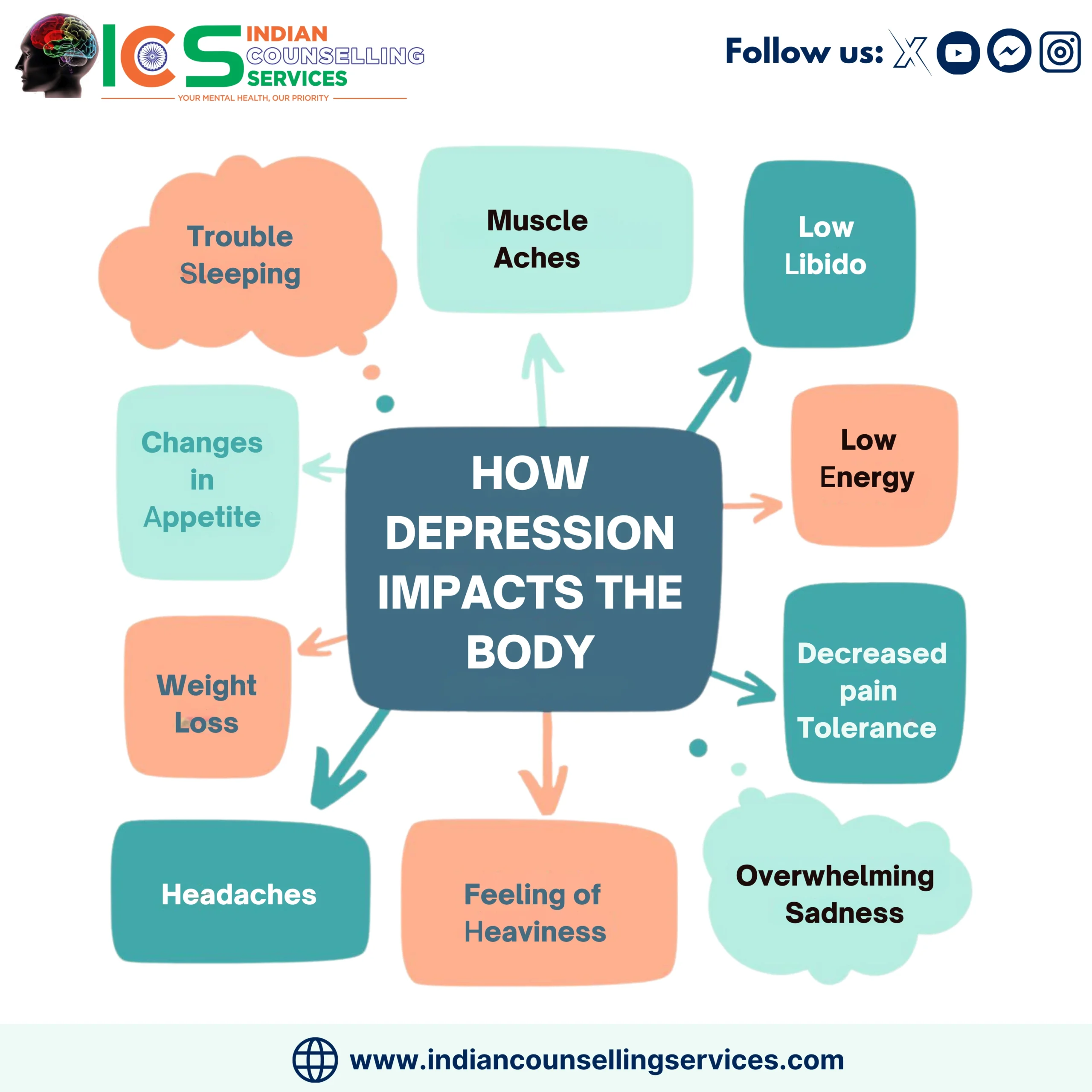
How Depression Affects Your Body Every Day
Depression is often regarded as a mental health condition, but its effects extend far beyond emotional well-being. It’s a whole-body experience that can disrupt physical health, daily routines, and overall functionality. Understanding how depression affects your body every day can help you recognize its symptoms, seek appropriate treatment, and take steps to mitigate its impact.
Depression is rooted in the brain, but its influence radiates throughout the body. The brain regulates critical processes such as mood, sleep, appetite, and energy. When depression alters the brain’s chemistry—primarily through imbalances in neurotransmitters like serotonin, dopamine, and norepinephrine—these processes become disrupted, leading to widespread physical effects.
A. Chronic Fatigue
One of the hallmark symptoms of depression is persistent fatigue. This goes beyond feeling tired after a long day. People with depression often experience an overwhelming lack of energy, even after adequate rest. The brain’s struggle to regulate neurotransmitters impacts energy production and usage, leaving individuals feeling drained throughout the day.
B. Memory and Concentration Issues
Cognitive impairments are common in depression. Difficulty concentrating, memory lapses, and a general sense of “mental fog” can make everyday tasks feel insurmountable. These issues stem from structural and functional changes in the hippocampus and prefrontal cortex, areas of the brain critical for memory and decision-making.

Depression triggers changes in the endocrine system, particularly involving the hypothalamic-pituitary-adrenal (HPA) axis, which governs the body’s stress response.
A. Increased Cortisol Levels
In people with depression, the HPA axis often becomes overactive, resulting in elevated cortisol levels—the body’s primary stress hormone. Chronically high cortisol can lead to symptoms such as:
Increased heart rate and blood pressure
Weight gain, particularly around the abdomen
Suppressed immune function
Increased susceptibility to illnesses
B. Hormonal Imbalances
For some, depression disrupts sex hormone levels, contributing to low libido and reproductive issues. Women may experience irregular menstrual cycles, while men might notice decreased testosterone levels.
Depression doesn’t just weigh on your mind; it also burdens your heart. Studies have linked depression to an increased risk of heart disease, stroke, and other cardiovascular issues.
A. Heart Rate and Blood Pressure
Anxiety and low mood often accompany depression, causing fluctuations in heart rate and blood pressure. These changes, combined with chronic stress, can strain the cardiovascular system over time.
B. Inflammation
Depression is associated with elevated levels of inflammatory markers, such as C-reactive protein (CRP). Chronic inflammation can damage blood vessels, leading to atherosclerosis (hardening of the arteries) and increasing the risk of cardiovascular events.
The gut and brain are intricately connected through the gut-brain axis. Depression can significantly affect digestive health, leading to symptoms such as:
A. Appetite Changes
Some people with depression experience a loss of appetite, leading to unintentional weight loss and nutritional deficiencies. Others may turn to food for comfort, resulting in overeating and weight gain. Both extremes can exacerbate physical health problems.
B. Digestive Disorders
Depression is linked to gastrointestinal conditions like irritable bowel syndrome (IBS). Symptoms such as stomach pain, bloating, and diarrhea may become chronic, further reducing quality of life.
Physical pain often accompanies depression, creating a vicious cycle where pain worsens mood and vice versa. Common issues include:
A. Muscle Tension
Depression can cause chronic muscle tension, especially in the neck, shoulders, and back. This tension may lead to persistent aches and stiffness.
B. Joint Pain
Inflammatory responses triggered by depression may also contribute to joint pain, mimicking symptoms of arthritis in some cases.
Depression significantly impacts sleep patterns, with many individuals experiencing insomnia or hypersomnia (excessive sleeping). These disruptions can create a feedback loop where poor sleep exacerbates depression, and depression further disrupts sleep.
A. Difficulty Falling or Staying Asleep
Insomnia is a common symptom of depression. People often lie awake ruminating on negative thoughts or wake up frequently throughout the night.
B. Oversleeping
On the flip side, some individuals sleep excessively yet still feel fatigued. This may be the body’s way of attempting to escape emotional pain, though it ultimately leads to reduced productivity and worsened symptoms.
Chronic stress and inflammation caused by depression can suppress the immune system, making the body more vulnerable to infections. Frequent colds, slower wound healing, and prolonged recovery times from illnesses are common in those with depression.
Beyond physical symptoms, depression can influence behavior in ways that indirectly harm the body. For example:
A. Reduced Physical Activity
The fatigue and lack of motivation associated with depression often lead to a sedentary lifestyle. This inactivity can result in weight gain, muscle atrophy, and increased risk of chronic illnesses like diabetes.
B. Substance Use
Some people turn to alcohol, tobacco, or other substances as a way to cope with depression. These habits can exacerbate health problems, leading to liver damage, lung disease, or dependency issues.
Understanding how depression affects your body highlights the importance of seeking help and adopting coping strategies. Here are some steps to break the cycle:
A. Therapy and Medication
Cognitive-behavioral therapy (CBT), psychotherapy, and antidepressant medications can help regulate brain chemistry and alleviate symptoms.
B. Exercise
Regular physical activity has been shown to boost mood and reduce inflammation. Even a daily walk can make a significant difference.
C. Healthy Diet
Eating a balanced diet rich in omega-3 fatty acids, whole grains, and fresh produce can support brain and body health. Avoid excessive sugar and processed foods, which can exacerbate mood swings.
D. Mindfulness and Relaxation Techniques
Practices like meditation, yoga, and deep-breathing exercises can help manage stress and promote relaxation.
E. Social Support
Reaching out to friends, family, or support groups can reduce feelings of isolation and provide encouragement.
Depression is not just an emotional disorder; it’s a whole-body condition that affects nearly every aspect of daily life. From cognitive impairments to chronic pain and weakened immunity, the physical toll of depression is substantial. However, with the right interventions and support, it is possible to manage these effects and improve overall well-being. If you or someone you know is struggling with depression, don’t hesitate to seek professional help. Recovery is possible, and every step forward is a step toward reclaiming a healthier, happier life.
Depression is not just an emotional disorder; it’s a whole-body condition that affects nearly every aspect of daily life. From cognitive impairments to chronic pain and weakened immunity, the physical toll of depression is substantial. However, with the right interventions and support, it is possible to manage these effects and improve overall well-being. If you or someone you know is struggling with depression, don’t hesitate to seek professional help. Recovery is possible, and every step forward is a step toward reclaiming a healthier, happier life.
